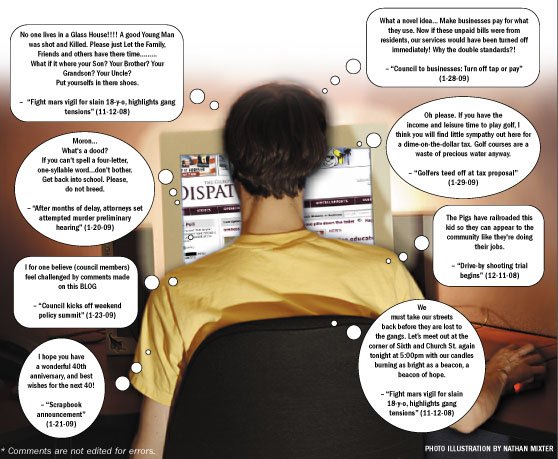Residents have only been posting and reading each others’
comments on the Dispatch Web site for about six months, but the
online forum has already exploded into a popular and unprecedented
place for people of all backgrounds to share and debate
– or sometimes just watch the fireworks.
Residents have only been posting and reading each others’ comments on the Dispatch Web site for about six months, but the online forum has already exploded into a popular and unprecedented place for people of all backgrounds to share and debate – or sometimes just watch the fireworks.
Police officers, self-proclaimed gang members, firefighters, developers, city officials, environmentalists and everyone in between frequent Gilroy’s electronic town square to see what people are writing and to have their own say.
Since August, there have been nearly 6,700 comments posted below various stories online, or about 40 per day. Gang-related incidents, developers eying farm land and the city’s budget troubles tend to spur especially long and spirited exchanges, but with these more controversial subjects also come racist and threatening comments that often snowball into epithets, insults and poor grammar – what the mayor called “pissing matches.”
“It’s wonderful that people have a place to make their comments, but the sad part is people do not take ownership for what they write online,” said Mayor Al Pinheiro, whose insurance company one anonymous reader recently urged others to boycott.
“Pick the phone up and tell Pinheiro what you think of him, but don’t hide behind the pen like that,” the mayor said, adding that personal attacks and “destructive” and “vulgar” comments outweigh the merits of free speech.
Regular posters tend to see their comments as corrective tools, though, and urge readers to take everything they read online with a grain of salt.
“The lure for me is to sometimes correct things that are wrong in stories,” said Dave McRae, a former Gilroy Unified School District trustee. He believed the Dispatch, as a private business, should impose its own decency standards on the comments, many of which he described as “juvenile.”
Alan Viarengo is another pro-comments resident who said he regularly posted his thoughts until someone hijacked his pseudonym – Al Jihad – last month and started writing inflammatory comments under his online moniker. Despite the veritable identity theft, Viarengo still loves the democracy and free range of a comment section, he said.
“I think it’s a great thing because it’s complete freedom. People can write whatever they want,” Viarengo said. “I think people should say what they want even if it’s ignorant.”
Gilroy Police Chief Denise Turner seemed to cringe at this mentality in an e-mail Monday.
“In many circumstances, the contributors do not know the real facts behind a decision or case. It is unfortunate because that is how incorrect information gets passed on,” Turner wrote.
But it is also how vigilant residents and criminals pass tips along.
Monday, a commentator made allegations about drug deals going on in Gilroy, and Turner said the department “can pick up intelligence information” from some exchanges, though she hopes residents will still call police. The Dispatch also aids police by reporting crimes and crime tips gleaned through comments to police.
Editors who monitor the message boards also remove grossly inflammatory language and gang proclamations as they are brought to editors’ attention. Still, police said suspected gang members surreptitiously relay information to one another via the Web site, “which can be very dangerous if they are threats against others or signaling to others to commit crimes,” Turner wrote.
For families dealing with the loss of a loved one due to gang violence and the press coverage that comes with it, this could mean reading calls for vengeance and a cold slew of racist I-told-you-sos.
The family of Larry Martinez Jr. experienced this after the 18-year-old was shot to death last November. People wrote positive and negative messages about the young man, his family, the police, gangs and what residents should expect. The Dispatch removed some of the more profane comments but left the majority up, including one from someone claiming to represent the Martinez family:
“(The family has) to see what cowardly people are saying about their son, brother, cousin and nephew. It is a shame. (The Dispatch) is just as responsible as these people that are putting these hateful comments … Let us grieve in peace and let Larry Martinez rest in peace!”
While people have been writing outrageous claims and airing their closet perversions in chat rooms since America Online was king, newspapers have always required letters to the editor to include a name and address. They still do, but online readers skip the formal introductions, and for safety’s sake, the Dispatch discourages commentators from divulging phone numbers, addresses “or other information that can be used to identify or locate you,” according to the terms of use that every commentator agrees to before posting. The terms also bar defamation and false statements but say such information “is the sole responsibility of the person who provided it.”
But not everyone who reads the comments also reviews the terms, and Jack Bates, the executive director of the California Newspaper Publishers Association, said that can be a problem.
“I have no objection to free speech – you can put anything out there you want, but don’t expect me to believe it,” Bates said. “But people should be aware of the credibility of what they’re reading. What (a comments section) lacks is what newspapers are good at, which is providing a very good news source.”
Comments may blur the divide between journalist and nameless hearsay, but McRae said people should write whatever they want while also obliging that little voice in the back of their heads.
“It’s easy online to get real harsh, but I think you want to edit yourself a little but and remember that etiquette,” McRae said.












